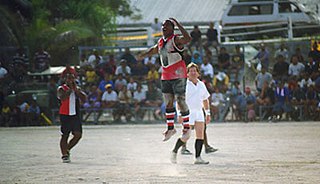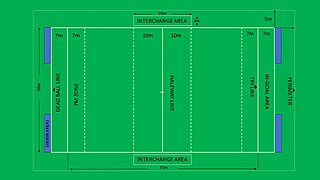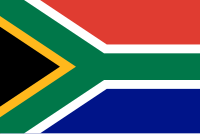The Australian Football International Cup is a triennial international tournament in Australian rules football. It is the biggest international tournament in the sport that is open to all nations. More than 26 nations have participated and the competition has expanded into multiple pools and both men and women's divisions. At the time of the last tournament in 2017, the sport had a record 170,744 registered players outside Australia growing at a rate of 25 per cent per annum.
AFL Canada is the governing body for men's and women's Australian rules football in Canada.

The Geography of Australian rules football describes the sport of Australian rules football played in more than 60 countries around the world. By 2017 more than 26 nations had contested the Australian Football International Cup, the highest level of worldwide competition.

The Canada national Australian rules football team represents Canada in Australian rules football. The men's side is known as the Northwind while the women's side is known as the Northern Lights. The national team is selected by AFL Canada the governing body for Australian rules football in Canada.

The Papua New Guinea national Australian rules football team represents Papua New Guinea in the team sport of Australian rules football. It is one of the nation's most successful sporting teams, currently ranked 2nd in the world behind Australia.

Women's Australian rules football, is the female-only form of Australian rules football, generally with some modification to the laws of the game.

The Scotland Under-19 cricket team represents the nation of Scotland in Under-19 cricket at international level.

The Zimbabwe national under-19 cricket team represents Zimbabwe in under-19 international cricket

Australia has named a senior Australian rules football team, known as the All-Australian team since 1947. This team, however has never officially played an international Australian rules football match. This is primarily because the sport is played professionally in Australia.

Australian rules football in Papua New Guinea (PNG) is a developing team sport which was initially introduced by Australian servicemen during World War II. The governing body for the sport is the PNG Rules Football Council, with the development body being AFL PNG. The junior development version is known locally as Niukick. Regionally, AFL PNG is affiliated with AFL Oceania.

AFL South Africa is the governing body and federation for Australian rules football in South Africa. Its name is due to its formal affiliation in 2004 to the AFL Commission the game's world governing body.
Australian rules football in South Africa is a team sport played at amateur level in the country with a small audience. The governing body is AFL South Africa.

The first Touch Football World Cup tournament was held in 1988. Touch football and the Touch Football World Cup are monitored by the international governing body for touch the Federation of International Touch (FIT). The Touch World Cup has been hosted in five continents but is yet to be played in South America. Australia has hosted the World Cup the most having hosted it thrice. While the number of participant teams is growing steadily, almost all finals to date have been contested between Australia and New Zealand. Australia has won the most finals.

The 2008 Australian Football International Cup was the third time the Australian Football International Cup, an international Australian rules football competition, has been contested.
The 2005 Australian Football International Cup was the second time that the Australian Football International Cup tournament, an international Australian rules football competition was held.
The 2002 Australian Football International Cup was the inaugural international Australian rules football tournament held in Melbourne, Australia in 2002.
The Flying Boomerangs are the underage Indigenous Australian Australian rules football team for men. The team has played tests against junior teams from Papua New Guinea, South Africa, New Zealand and developing pacific nations.

The Canada national under-19 cricket team represents the country of Canada in under-19 international cricket.
The 2017 Australian Football International Cup was the sixth edition of the Australian Football International Cup, a triennial international Australian rules football competition run by the Australian Football League (AFL).
The following list is a complete collection of results for the PNG Kumuls.












